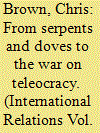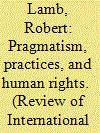| Srl | Item |
| 1 |
ID:
176033


|
|
|
|
|
| Summary/Abstract |
In one of his earliest papers, ‘Serpents and Doves in Classical International Theory’ (1988), Nick Rengger set out themes that would be important to him for the next thirty years, including a Rortyan/Oakeshottian commitment to conversation as the appropriate mode of human inquiry, with the premise that there is no truth to be discovered, and a healthy scepticism directed towards reformist projects in international relations. These themes are present in his final works on just war and the anti-Pelagian imagination, but in a new, and less attractive, more dogmatic form. His critique of ‘teleocracy’ had hardened into something that no longer resembled a conversation, and his critique of progressivism involved the burning of a multitude of straw men. In 1988 Rengger aspired to be one of Rorty’s ‘edifying’ philosophers, by 2018 he seemed to have become committed to a system.
|
|
|
|
|
|
|
|
|
|
|
|
|
|
|
|
| 2 |
ID:
093583


|
|
|
| 3 |
ID:
168864


|
|
|
|
|
| Summary/Abstract |
This article is an intervention in recent debates about conceptual and normative theorisations of human rights, which have been increasingly characterised by a divide between ‘moral’ and ‘practice-based’/’political’ understandings. My aim is to articulate an alternative, pragmatist understanding of human rights, one that is importantly distinct from the practice-based account with which it might be thought affiliated. In the first part of the article, I reveal the fundamental flaw in the practice-based account of human rights: I argue that it is undermined by the ontological thesis at its heart, which naturalises and reifies political arrangements and institutions that are radically contingent. In the second part, I identify, and outline the attractiveness of, a pragmatist normative account of human rights. In contrast to the practice-based approach, this pragmatist account construes human rights in ideational terms. The pragmatist understanding accepts both the contingency of our practices and the cultural limits to moral justification, while nevertheless retaining a commitment to the enterprise of normative philosophical conversation. I argue, in contrast to prevailing interpretations, that the international theory advanced by John Rawls exemplifies a pragmatist account of human rights and points a way forward for theoretically fruitful but appropriately circumscribed analysis of the concept.
|
|
|
|
|
|
|
|
|
|
|
|
|
|
|
|